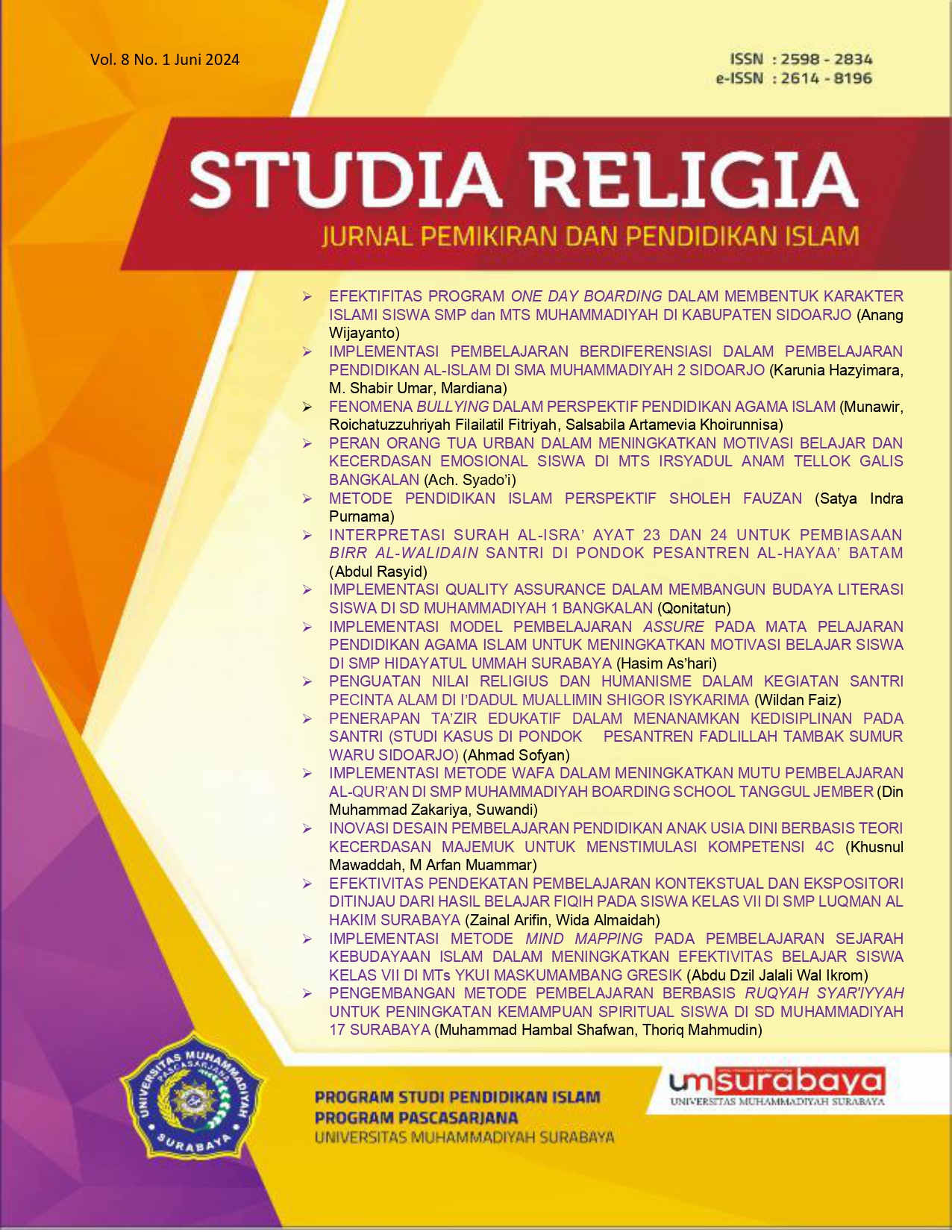EFEKTIVITAS PENDEKATAN PEMBELAJARAN KONTEKSTUAL DAN EKSPOSITORI DITINJAU DARI HASIL BELAJAR FIQIH PADA SISWA KELAS VII DI SMP LUQMAN AL HAKIM SURABAYA
DOI:
https://doi.org/10.30651/sr.v8i1.22493Abstract
The aim of this research is to analyze the effectiveness of contextual and expository learning approaches, and compare which of the two approaches is more effective when viewed from the fiqh learning outcomes of class VII students at Luqman Al Hakim Middle School, Surabaya. This research uses a quantitative approach with comparative methods. The research subjects were class VII students, totaling 5 classes divided into 2 groups, namely the contextual approach group and the expository approach group. Data analysis uses student learning outcomes (written test results), using an average difference test between the two class groups. Statistical testing in this research was carried out using SPSS for Windows software version 20.00. From the results of descriptive statistics, the average learning result of the contextual approach group with 46 students was 84.48, and the learning completeness with KKM 75 reached 93.47%. Thus, it can be said that the contextual approach is effective in class VII fiqh learning. Meanwhile, the average learning outcome for the expository approach group with 58 students was 81.55, for learning completeness it was 87.93%. So it can be said that the expository approach is quite effective in class VII fiqh learning. There is a difference in the average learning outcomes between the two groups. And to prove whether the difference is significant, an average difference test is carried out. The average difference test was carried out using the Mann Whitney U Test. From the results of this test, the p-value of the learning outcomes data is 0.031 < 0.05. So it can be stated that there is a significant difference in the learning outcomes of classes that receive a contextual learning approach and the learning outcomes of classes that receive an expository learning approach. This means that the contextual learning approach, if viewed from the results of class VII fiqh learning, is more effective than the expository learning approach.
References
Anggraena, Yogi, Nisa Felicia, Dion Eprijum, Indah Pratiwi, Bakti Utama, Leli Alhapip, and Dewi Widiaswati. Kurikulum Untuk Pemulihan Pembelajaran. Jakarta: Pusat Kurikulum dan Pembelajaran Kementerian Pendidikan, Kebudayaan, Riset, dan Teknologi, 2022.
Elihami, Elihami, and Abdullah Syahid. “Penerapan Pembelajaran Pendidikan Agama Islam Dalam Membentuk Karakter Pribadi Yang Islami.” Edumaspul - Jurnal Pendidikan 2, no. 1 (2018): 79–96.
Fahrudin, Hasan Asari, Siti Halimah. Pendidikan Agama Islam Dan Budi Pekerti. Journal of Chemical Information and Modeling. Vol. 53, 2019.
Fatmawati, Ira. “Peran Guru Dalam Pengembangan Kurikulum Dan Pembelajaran.” Revorma: Jurnal Pendidikan dan Pemikiran 1, no. 1 (2021): 20–37.
Hanso, Blum. “Peran Pendidikan Dalam Memembentuk Karakter Bangsa Menghadapi Era Masyarakat Ekonomi ASEAN (MEA).” jurnal rontal keilmuan PPKn 2 (2016): 1–7.
Khobir, Abdul. “PENDIDIKAN AGAMA ISLAM DI ERA GLOBALISASI.” Forum tarbiyah 07, no. 01 (2009): 1–11. https://media.neliti.com/media/publications/69343-ID-none.pdf.
Moeleong, Lexy. Metodologi Penelitian Kualitatif. Bandung: Remaja Rosdakarya, 2002.
Shafwan, Muhammad Hambal. “ANALISIS PENANGGULANGAN KENAKALAN REMAJA MELALUI PENDIDIKAN AKHLAK SISWA DI MAM 4 SEDAYULAWAS BRONDONG LAMONGAN.” Studia religia 5, no. 2 (n.d.): 318–327. http://103.114.35.30/index.php/Studia/article/view/10237/pdf.
Sugiyono. Metode Penelitian Kuantitatif, Kualitatif, Dan R&D. Bandung: Alfabeta, 2010.
Tholani, Mokhamad Ishaq. “Problematika Pendidikan Di Indonesia ( Telaah Aspek Budaya ).” Jurnal Pendidikan 1, no. 2 (2013): 64–74.
Tolchah, Moch. “Filsafat Pendidikan Islam: Konstruksi Tipologis Dalam Pengembangan Kurikulum.” Tsaqafah 11, no. 02 (2015). https://ejournal.unida.gontor.ac.id/index.php/tsaqafah/article/view/274.
———. Promlematika Pendidikan Agama Islam Dan Solusinya. Surabaya: Kanzum Books, 2020.
Wabaa, M., Laloma A., and V. Londa. “Pengaruh Globalisasi Informasi Terhadap Kehidupan Sosial Budaya Generasi Muda ( Suatu Studi Di Sma Negeri 1 Beo Kabupaten Kepulauan Talaud ).” Jurnal Administrasi Publik UNSRAT 4, no. 5 (2014): 1247.
Downloads
Published
Issue
Section
License
Copyright (c) 2024 Zainal Arifin, Wida Almaidah

This work is licensed under a Creative Commons Attribution-NonCommercial 4.0 International License.
Penulis tetap memegang hak atas karyanya dan memberikan hak publikasi pertama kepada jurnal ini yang secara simultan karya tersebut dilisensikan di bawah:
Creative Commons Attribution-NonCommercial 4.0 International License









